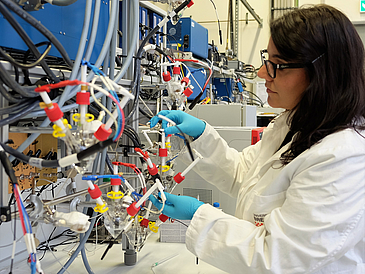The environmentally friendly energy supply of the future is one of the most discussed topics of our time. Our society needs and wants to become independent of fossil fuels in order to reduce CO2 emissions and defy climate change. "Green energy" from renewable sources such as wind farms and solar panels has received an unprecedented push. But developing ever cheaper and more environmentally friendly energy storage is just as important as "harvesting" the power. This is the only way to stabilize the power grid in the future, as it needs to be protected from power peaks or blackouts.
"Unfortunately, the already established energy storage technologies - such as the widely used lithium-ion batteries - are suboptimal in terms of environmental friendliness, cost-effectiveness, and safety due to the very strict specifications of the stationary energy storage market," says Professor Fabio La Mantia, head of the Energy Storage and Conversion Systems unit at the University of Bremen. He and his team are therefore researching in a different direction: "There is an emerging green energy storage technology based on abundant and inexpensive metallic zinc. Aqueous zinc-ion batteries could solve the current problems!"
Water-Based Technology Eliminates Hazards
Because this technology is water-based, any risk of explosion or fire is eliminated. Additionally, as the name suggests, zinc-ion batteries are composed primarily of metallic zinc and other mostly inexpensive and non-toxic materials. This not only reduces the final price of green energy, but at the same time reduces the risk of environmental pollution.
Despite the good specifications, however, aqueous zinc-ion battery technology is currently still far from large-scale commercialization. Researchers at the University of Bremen are focusing on overcoming the challenges to make aqueous zinc-ion batteries market-ready. Fabio La Mantia's research group is focusing on developing novel zinc-based anodes, which are to improve the stability and lifetime of zinc-ion batteries. The group is also working on the development of low-cost environmentally friendly cathode materials and the optimization of water-based electrolytes.
In the prestigious scientific journal Nature Communications, Professor La Mantia and his team have now described the important challenges that the scientific community will soon face in advancing this novel battery technology. In addition, they have developed guidelines for good experimental practice so that scientists from around the world can align their research efforts with industry standards and needs. Fabio La Mantia: "The goal is to accelerate the commercialization of this promising, environmentally friendly battery technology."
The Research Group
The Energy Storage and Conversion Systems research group was established in July 2015 within the Faculty of Production Engineering at the University of Bremen in cooperation with Fraunhofer IFAM. It is made up of a group of young researchers who are particularly focused on the electrochemical conversion of chemical to electrical energy and developing efficient methods for energy storage. The working group deals with a variety of different topics in the field of experimental electrochemistry, with the experiments being supported by physical modeling.
Funding
The research into aqueous zinc-ion batteries carried out in Professor La Mantia’s research group is funded by the German Federal Ministry of Education and Research (BMBF) through the project "ZIB" (FKZ 03XP0204A).
Link to the Original Publication:
Giorgia Zampardi, Fabio La Mantia: “Open challenges and good experimental practices in the research field of aqueous Zn-ion batteries”, Nature Communications, 2022, DOI: 10.1038/s41467-022-28381-x, https://www.nature.com/articles/s41467-022-28381-x
Further Information:
www.esecs.uni-bremen.de/en/
www.uni-bremen.de/en/
Contact:
Prof. Fabio La Mantia
Head of the Energy Storage and Conversion Systems Research Group at the University of Bremen
Director of the Institute for Advanced Energy Systems
Head of Simulation and Modeling at Fraunhofer IFAM
Phone: +49 421 2246-7331
Email: lamantiaprotect me ?!uni-bremenprotect me ?!.de

